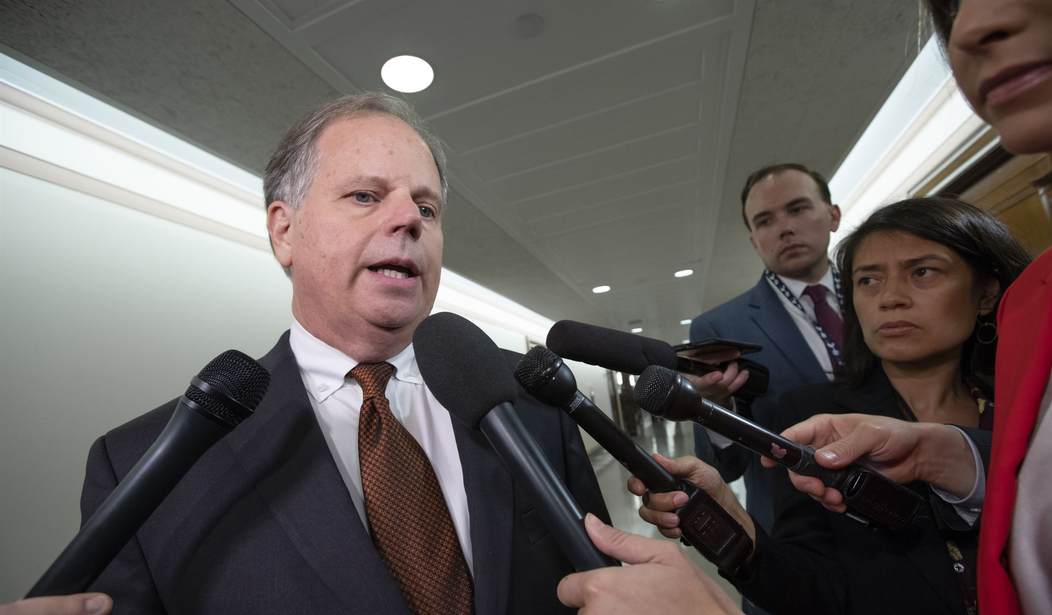Sen. Doug Jones, D-Ala., tweeted in response to anti-abortion legislation passed by the Alabama legislature: "I refuse to believe that these Republican men represent the views of most Alabamians. Their action is both unconstitutional and shameful. The people of Alabama deserve to be on the #rightsideofhistory -- not the side of extremists. Women deserve better."
It seems much more likely that Jones is the one who is out of step. A 2014 Pew poll found that Alabama is among the most "pro-life" states in the country, with 58 percent saying the procedure should be illegal in "all or most cases." It's possible that among the 58 percent who oppose abortion in Alabama, some will find the legislation passed this week to be too extreme, but don't count on it. Just last year, voters approved a state constitutional amendment declaring that it is "the public policy of this state to recognize and support the sanctity of unborn life and the rights of unborn children." Fifty-nine percent of voters voted in favor.
Since the vote making abortion illegal in Alabama, Republican members of the Alabama senate have been targets of accusations -- mostly that they are male and white. A number of outlets pointed to the fact that all 25 votes in favor of legislation were white male Republicans. OK. But the Alabama house has lots of Republican women. The bill's sponsor in the lower chamber was a woman, as was the governor who signed the bill.
Those who fixate on the "problem" of whiteness may think this is some sort of knockout blow, but the truth is that these senators are accurately representing the views of their constituents, including women. A 2018 PRRI survey found that 60 percent of Republican women agreed with the statement, "Roe v. Wade was wrongly decided and should be overturned." This compared with only 47 percent of Republican men. Democratic pollster Celinda Lake notes that women tend to be more religious than men, and this aligns with more conservative views on abortion.
Recommended
Still, partisan lines remain blurry on abortion. More than a third of Republicans favor keeping abortion legal. Until Brett Kavanaugh's ascension to the Supreme Court, the issue may not have ranked very high for them. They could vote for Republicans -- with whom they agree on other issues -- safe in the knowledge that nothing would threaten the regime of legal abortion throughout the nation. Now that the Court has a possible majority for overturning Roe, the calculations of moderate Republicans may change.
Moderate Democrats may be out in the cold, too. In the aftermath of the 2018 election, Democrats burst from the gate with legislation that expanded abortion even beyond Roe's contours. New York passed the Reproductive Health Act that permits even late-term abortions in the "absence of fetal viability, or (when) the abortion is necessary to protect the patient's life or health." When health is interpreted to mean "mental health," it opens a gaping loophole. Sometimes late-term pregnancies must be terminated to save the mother's physical health, but that doesn't mean an abortion is required. Even very premature infants commonly survive these days.
Democrats also painted themselves as abortion extremists by opposing the Born-Alive Abortion Survivors Protection Act, insisting -- falsely -- that these abortions are only performed when there are severe fetal abnormalities or when the mother's life is at risk.
But now Republicans risk being viewed as extremists. With seven states having passed abortion laws that may transgress the boundaries established by Roe, the question now is whether the "pro-life" cause is best served by this frontal assault strategy. The Alabama law makes no exceptions for cases of rape or incest. And while it's true that the child bears no guilt for the way he or she was conceived, it may not be prudent to refuse to concede that ground. A 2018 Gallup poll found that 77 percent of respondents want abortion to be legal in cases of rape and incest. The exception has long been included in other "pro-life" legislation, like the Hyde Amendment.
Whatever happens, these stirrings at the state level may provoke an overdue reckoning about the truth of abortion. It isn't rare. It is usually performed on perfectly healthy mothers and babies. And it isn't the only alternative for women unable to raise a child. There are 36 couples waiting for an adoptive child for every one placed. Why is that humane solution so commonly overlooked?
Mona Charen is a senior fellow at the Ethics and Public Policy Center. Her new book is "Sex Matters: How Modern Feminism Lost Touch with Science, Love, and Common Sense." To read features by other Creators Syndicate writers and cartoonists, visit the Creators Syndicate webpage at www.creators.com.

























Join the conversation as a VIP Member